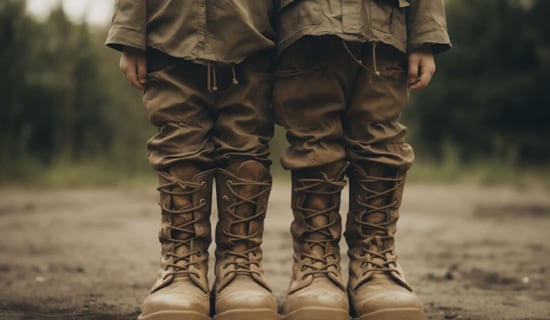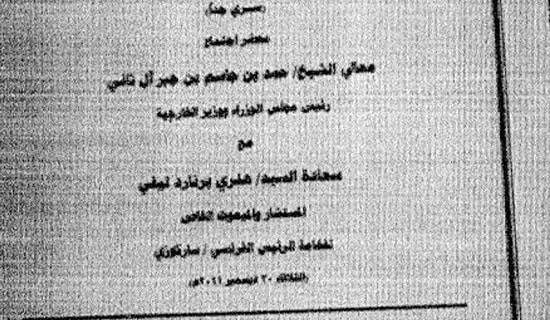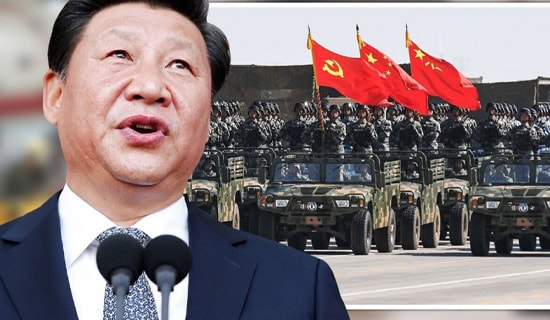Russia This Week is a weekly review by the MEMRI Russian Media Studies Project, covering the latest Russia-related news and analysis from media in Russia, the Caucasus, Central Asia, and Eastern Europe.
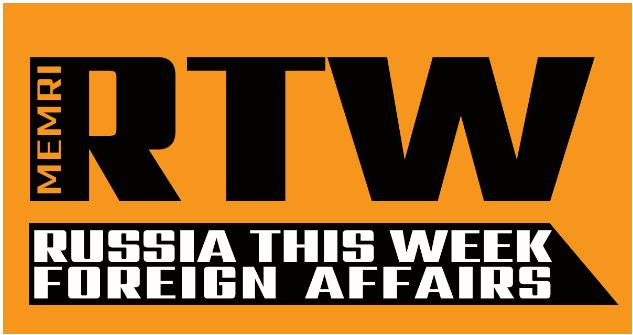
In The News:
Russian Relations With The West
The Russian Foreign Ministry Collegium convened to analyze Russia-West relations and prospects for their development. The Foreign Ministry wrote: "It was pointed out that these relations had deteriorated through the fault of Russia’s Western partners. However, common challenges that the international community is facing, including the threat of international terrorism, highlight the vital importance of normalizing the current abnormal situation and returning Russia-West relations to a footing of constructive cooperation. Russia is open to such joint work, including with the new U.S. administration. However, equal and honest interaction is only possible if the attempts to 'contain' Russia are abandoned and if relations are based on the principle of non-interference in internal affairs and respect for each other’s interests. We hope that our partners’ objective interests will help them realize their collective responsibility for global strategic stability and accept the fact that international problems can only be solved through concerted efforts. The Foreign Ministry Collegium has outlined the ministry’s tasks in developing dialogue with Russia’s Western partners."
(Mid.ru, March 15, 2017)
Russia-UK Relations
UK Prime Minster Theresa May appointed UK Minister for the Cabinet Office Ben Gummer to be responsible for anti-subversion, in order to enhance national security amid speculations of Russia's interference in the next election. The Russian Embassy in the UK has urged London to stop its anti-Russian campaign harming bilateral relations. The Russian Embassy wrote: "It is reported, that [UK] Prime Minister Theresa May appointed 'an anti-subversion minister' charged with 'protection of integrity of UK democratic life'. The media, including The Sunday Times, also report on the warning issued by GCHQ/National Cybersecurity Centre (its director C.Martin) to the British political parties on presumed 'Russian threat' of meddling in the next elections due in 2020. In fact, Russia is accused of conducting subversive activity against Britain. We absolutely cannot accept that. In that regard highly relevant are the words of Foreign Secretary Boris Johnson that Britain has no evidence of Russia’s interference in the UK domestic affairs. And this is true.
"At the same time we would like to note that already for a long time a brutal propaganda campaign has been underway to paint Russia as a country engaged in undermining Britain, including through hacking. Key to all this is that those allegations are not supported by any evidence or facts. And the Foreign Secretary had to admit that. Still, the campaign is going on, and the British people are being scared by the so-called 'Russian threat'.
"However, it is well-known that according to the reports, it is the British special services, who together with the CIA are active in development of technologies for total surveillance over the private life of citizens and society as a whole. Particularly broad possibilities for that are associated with the CIA library of 'fingerprints'/stolen identities of various foreign hackers which could be used to put blame on others. That makes the murky business of hacking even murkier. The British special services, among other things, seem to be rendering CIA sisterly assistance in trying to divert attention from the intelligence debacle of the latest Wikileaks disclosure, as all too often, at Russia’s expense. We call upon the British side to stop its anti-Russian campaign which undermines our bilateral relationship."
(Rusemb.org.uk, March 13, 2017)
Commenting on the appointment, Russian Senator Oleg Morozov, member of the Foreign Affairs Committee in the Federal Council, said: "Apparently this is a pre-election campaign element. One of the political spins in the West at the moment is 'whoever scares the voter more with the threat of evil Russian, would win the elections'. Theresa May is apparently starting to scare the voters."
(Ria.ru, March 13, 2017)
Claims That Russian Special Forces Are Acting In Egypt
Reuters reported that Russia deployed Special Forces to an air base at Sidi Barrani, in Egypt, near the Libyan border. Reuters reported: "The U.S. and diplomatic officials said any such Russian deployment might be part of a bid to support Libyan military commander Khalifa Haftar, who suffered a setback with an attack on March 3 by the Benghazi Defence Brigades (BDB) on oil ports controlled by his forces...Egyptian security sources offered more detail, describing a 22-member Russian special forces unit, but declined to discuss its mission. They added that Russia also used another Egyptian base farther east in Marsa Matrouh in early February."
The Russian Defense Ministry denied the reports. Russia’s Defense Ministry Spokesman, Igor Konashenkov, said: "There are no Russian special operations units in Sidi Barrani [the Arab Republic of Egypt]." He then added: "Western media outlets have been stirring up the public with such info leaks from anonymous sources for a while. Such 'insights' especially frequently visit anonymous sources in Ukraine and the Baltic states. And the words by Reuters about the U.S. intelligence services, citing the same source saying that 'U.S. intelligence on Russian military activities is often complicated by its use of contractors or forces without uniforms looks especially silly and ridiculous."
(Tass.com, March 14, 2017)
Commenting on the news, Russian Foreign Minister Sergey Lavrov said: "I did see reports by some foreign agencies to the effect a couple of dozen military specialists were seen in Egyptian territory and that some drones were seen there, too, I have not heard about that from any other sources." He then added: "In any case, if the rumors concern the military, then go and ask the military. I can only say that I am responsible for diplomats, but there have no diplomats in Libya for a long time. They are forced to remain in Tunisia and address the Libyan affairs from there."
(Tass.com, March 14, 2017)
Kremlin spokesman Dmitry Peskov said: "We do not have such information."
(Tass.com, March 14, 2017)
Senators Dzhabarov and Ozerov from the Federation Council have also denied that Russia sent its troops to Egypt. Both called the Reuters publication a "part of the information war" and a "continuation of the anti-Russian rhetoric in an attempt to discredit Russia in the realm of applying armed force abroad".
(/Ria.ru, March 14, 2017)
SUPPORT OUR WORK

However, the Russian blog Diana-mihailova.livejournal.com, known for its inside stories, published that at least 4 military Ilyushin aircrafts flew from Sidi-Barrani airfield to Latakia, in Syria, on February 2. The following radar images are taken from Flightradar24.com website, a known internet-based service that shows real-time aircraft flight information on a map. The images were republished by other influential blogs.


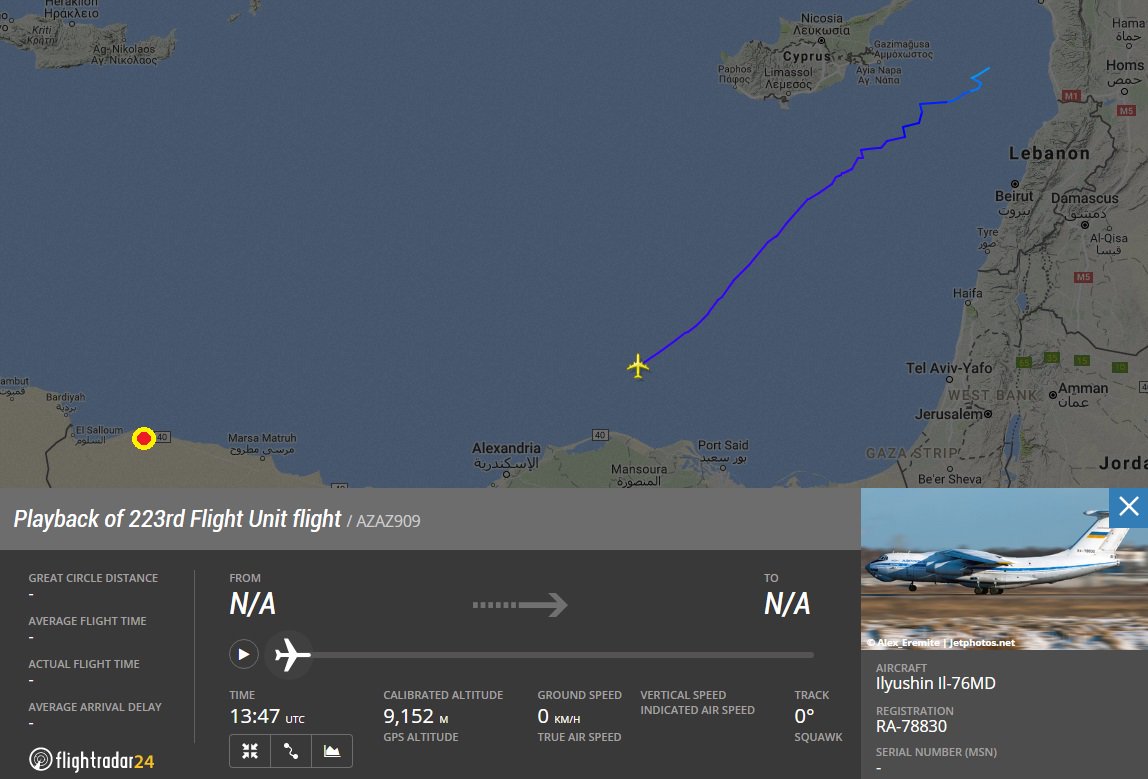
(Source: Diana-mihailova.livejournal.com, February 1, 2017)
On October, 10, 2016, Izvestia quoted two different sources confirming that Russia is negotiating with Egypt for permission to deploy its troops at Sidi Barrani, a former Soviet Naval and air base on a long term rental basis. According to the publication the base was expected to become operational in 2019.
Back in October, MP Andrey Krasov, deputy chair of the Duma Defense Committee, commented: "At the moment a growing number of states, including Egypt, have begun recognizing Russia's role in preserving the global balance of forces. It's one thing to fight terror by uttering words, and an entirely different story to take concrete measures, as the Russian Federation does. I think that we have to boost cooperation with Egypt and this includes a joint rebuilding of a military air base."
(Izvestia.ru, October 10, 2016)
Concerning Russia's support to Libya, the Russian news agency RIA recently interviewed Libyan Parliament Speaker Aguila Saleh Issa, who cooperates with Marshal Khalifa Haftar. In the interview, Issa said: "We asked the Russian government to assist us in training the military servicemen...and repairing military hardware by Russian experts because most of our officers studied in Russia, many have a command of Russian and know how to operate Russian weaponry. We've been promised support in fighting terror."
(Ria.ru, March 14, 2017)
See MEMRI Special Dispatch No. 6806, Russian Daily 'Kommersant': 'From Moscow's Point Of View, [Libya's] Marshal Haftar Seems To Be A Promising Partner,' February 28, 2017.
Russia-Iran Relations
Russian ambassador to Iran Levan Dzhagaryan confirmed that Iranian President Rouhani will visit Moscow towards the end of March. The ambassador said that Russia and Iran plan to introduce visa-free trips for citizens of the two countries as part of tour groups (from 5 to 50 people). Dzhagaryan added that he does not share the American and Saudi position that Iran is a major destabilizing factor in the Middle East region. On the contrary, according to Dzhagaryan, Iran plays a positive and stabilizing role.
(Ria.ru, February 6, 2017) (Tasnimnews.com/en, February 8, 2017)
Russia and Iran discussed contracts estimated at $10 billion. The Russian Energy Minister Alexander Novak, informed reporters on Monday. Following a meeting with Iran's Minister of Communications and Information Technology Mahmoud Vaezi, Russian Energy Minister Alexander Novak said: “There's a large range. Today we talked [about contracts] totaling approximately $10 billion.”
(Gazeta.ru, March 13, 2017)
During the Astana talks (March 14-15), Iran officially became a country along with Russia and Turkey guaranteeing the truce in Syria.
(Tass.com, March 15, 2017)
Russia's Future In 12 Years
The Russian media outlet Pravdareport.com reported: "Russia's Security Council develops a strategic forecast for more than 12 years. The draft document, which the department develops for the first time, has been submitted to the government for expertise. According to official spokesman for the Russian Security Council, Yevgeny Anoshin, the document analyses Russia's position in the world, the risks, threats and challenges that the country will take in a long-term perspective... The strategic forecast is to become the ground for making decisions under various circumstances that may appear inside and outside Russia.
"[The secretary of the Security Council of the Russian Federation said]: 'The document is being developed at the instruction from the Russian president for 12 years, taking into account the data provided by federal executive bodies, executive authorities of constituent entities of the Russian Federation and the Russian Academy of Sciences. The strategic forecast is adjusted every six years.'"
(Pravdareport.com, March 17, 2017)
Drills
Aerospace Force Commander-in-Chief Colonel-General Viktor Bondarev said in an interview with the defense ministry's Krasnaya Zvezda newspaper: "The Space Troops will team up with other branches and services of the Russian Armed Forces to practice detecting ballistic missiles, using the forces and resources of the (Special Designation) Aerospace Army during the demonstrative launches of intercontinental ballistic missiles by the Strategic Missile Force." Bondarev added: "Live tests have been scheduled in anti-ballistic missile defense units with the launch of an anti-missile, as well as over ten joint drills for ABM system crews to prepare counter-missiles for combat use, and also measures to detect and track the launches of domestic carrier rockets and to monitor space vehicles."
Russian news agency TASS reported: "Over 100 staff drills have been planned to train the space forces’ governance bodies of various level. As many as 40 tactical drills with subordinate military units will be held under the direction of the commanders of space troops’ formations... Russia’s Aerospace Force plans to carry out 15 launches of carrier rockets in 2017."
(Tass.com, March 15, 2017)
EU Sanctions Against Russian And Ukrainian Individuals
The EU extended the sanctions against Russian and Ukrainian individuals and legal entities for another six months until September 2017. The EU sanctions list comprises 150 individuals and 37 entities. The Russian News Agency TASS explained: "The black list is just one of three independent sanction packages of the EU. Economic sanctions targeting specific sectors of the Russian economy renewed every six months are currently in place until July 2017. Trade and visa restrictions against Crimea are also in force and are reviewed annually."
(Tass.com, March 13, 2017)
Interview Of The Week
On March 6, the leader of the Italian party Northern League (Lega Nord) Matteo Salvini met with Russian Minister of Foreign Affairs Sergey Lavrov, in Moscow. The Italian pro-League media outlet Ilpopulista.it described the meeting as "historical" for Salvini. Ilpopulista.it wrote: "The meeting is of relevance if we consider that it is most unusual for a Russian foreign minister to meet a political leader who, presently, does not hold any government position (Lavrov, for instance, has not yet met his Italian counterpart Angelino Alfano). Therefore, this is an important token of esteem and friendship."
Below are excerpts from Salvini's interview describing his meeting with Lavrov:
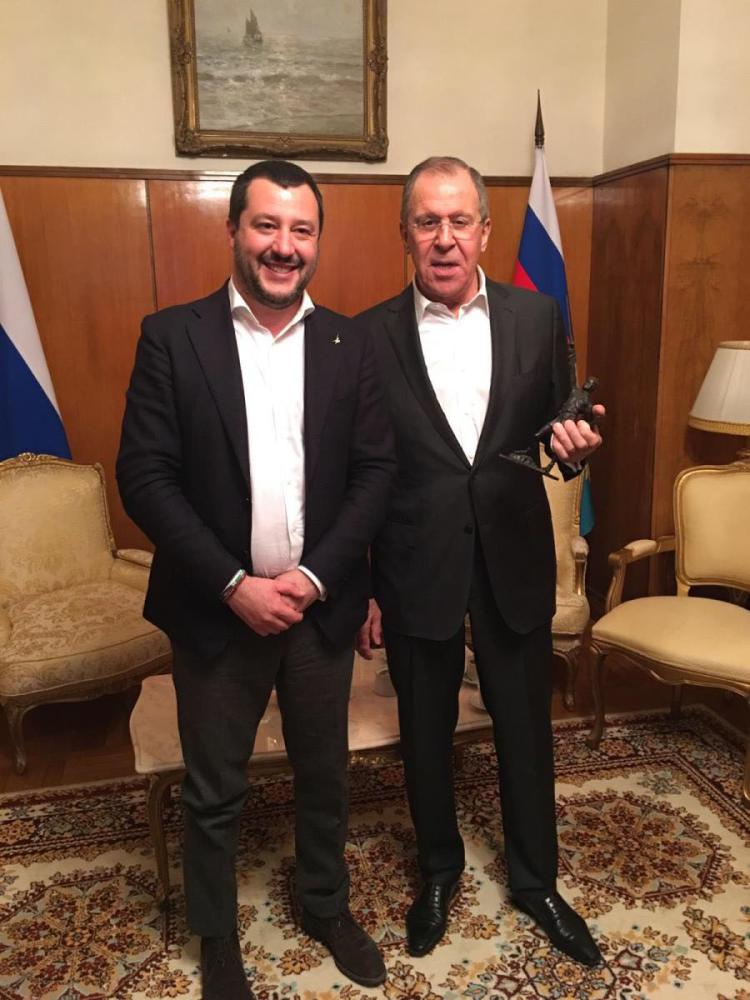
Matteo Salvini and Sergey Lavrov (Source: Ilpopulista.it)
Q: Salvini, what were your impressions?
Salvini: "The thirty-five minutes of discussions that I had with Minister Lavrov confirmed that the Kremlin has very clear and positive ideas for the future. We discussed the main topics of international politics, the security threats to our countries and the perspectives for Europe. It has been a unique opportunity to reaffirm and strengthen the friendship between Italy and Russia. We also recalled the long and friendly meeting that I had the pleasure of conducting in Milan, in 2014, with president Putin."
Q: Concerning foreign policy, what are the main emergencies?
Salvini: "There is great concern for Libya’s internal situation that is presently out of control, resulting in an uncontrolled immigration [flow] towards Europe and, in particular, towards the Italian coasts. I acknowledge that, also in this case, it is Russia which makes contacts with all the stakeholders in order to compensate for the unbelievable absence of the European Union and of all the remaining international organizations. On behalf of many people, I thanked the minister [Lavrov] for the Russian intervention in Syria against ISIS."
Q: "Despite Moscow’s engagement against Islamic terrorism, which contributes in a substantial manner to the continent's security, the European Union has not yet decided to remove economic sanctions [against Russia] ..."
Salvini: "This is an absurd and paradoxical situation which is causing harmful damages to enterprises and workers. Concerning Italy, sanctions have cost a huge amount, more than 5 billion Euros and thousands of lost jobs. [In Moscow,] we reached the conclusion that we should urgently remove the sanctions, while stressing the League’s commitment in this sense, and my personal one, since the League has always been on this frontline, as the minister is very aware of."
Q: Did you also speak about the political perspectives for Italy?
Salvini: "Of course, I presented to Lavrov the League’s ideas and propositions for governing Italy and for changing Europe. In particular, the minister shares the analysis concerning the excessive centralization of powers in Europe... I also would like to stress one point of which I’m proud."
Q: "Please go on..."
Salvini: "Minister Lavrov thanked me for the sympathy as well as the courage that the League displayed from the very start of the crisis in Crimea. We were in fact the first ones, in October 2014, to officially visit the region after the referendum via which the citizens chose to go home, to the Russian motherland. One of the priorities of our government's foreign policy will not only be the restoration of excellent official relations between our two countries, but also to foster a dialogue between Russia and the United States in the interest of the world’s peace and security."
(Ilpopulista.it, March 6, 2017)

Salvini signs cooperation agreement between the Northern League and the ruling United Russia Party (See YouTube video)


